

Saprographs: parasitical writings. I am uneasy with some of the emphasis placed on the so-called ‘later Lacan,’[1] not for any reason to do with the relevance or substance of the work, not because I think that the later Lacan has nothing to offer or lacks significance – far from it.
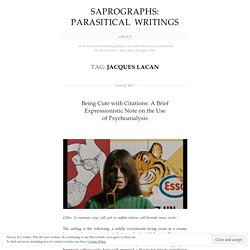
My unease arises from a certain emphasis and a fear that a hastiness in interpretation and indexation may do us more harm than good. Let me try to express what I refer to by this term emphasis. This account of what we are faced with in terms of subjectivisation in a post-Lacan epoch is expressed eloquently by David Ferraro in a recent piece. Introduction to Roland Barthes, Module on Plot and Plotting. Review of The Limits of Critique : Mediations : Journal of the Marxist Literary Group.
George Porter Thomas.
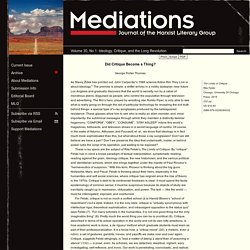
"Did Critique Become a Thing?. " Mediations Volume 30, No 1 As Slavoj Žižek has pointed out, John Carpenter’s 1986 science-fiction film They Live is about ideology.1 The premise is simple: a drifter arrives in a mildly dystopian near future Los Angeles and gradually discovers that the world is secretly run by a cabal of monstrous aliens, disguised as people, who control the population through television and advertising. Criticism vs critique. Criticism To find fault with: criticized the decision as unrealistic..
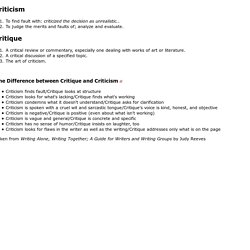
Critique versus Criticize. By Michael Kandel Claire Kehrwald Cook, in her Line by Line, noted that critique as a verb “has not yet won full acceptance.”
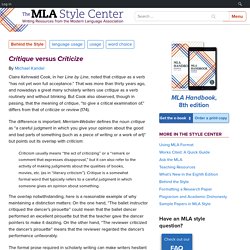
That was more than thirty years ago, and nowadays a great many scholarly writers use critique as a verb routinely and without blinking. Post-Modern Feminist Philosophy: Summary of "Approaching Abjection" by Kristeva. There is a great deal going on in this essay, so I will attempt to describe the general project and some of its most compelling points.
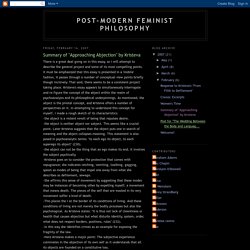
It must be emphasized that this essay is presented in a 'mobile' fashion, it passes through a number of conceptual view points briefly though incisively. That said, there seems to be a consistent project taking place. Literary Theory. "Literary theory" is the body of ideas and methods we use in the practical reading of literature.
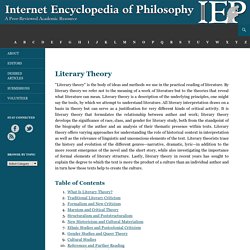
By literary theory we refer not to the meaning of a work of literature but to the theories that reveal what literature can mean. Literary theory is a description of the underlying principles, one might say the tools, by which we attempt to understand literature. All literary interpretation draws on a basis in theory but can serve as a justification for very different kinds of critical activity. Review of The Limits of Critique : Mediations : Journal of the Marxist Literary Group. Death of the critic? Review: ‘The Ministry of Utmost Happiness,’ by Arundhati Roy. Roy appeared to want no part of any of this.
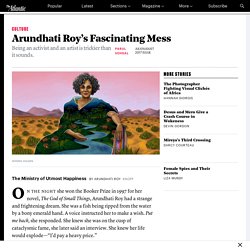
She chopped off her hair after the Booker win, telling The New York Times she didn’t want to be known “as some pretty woman who wrote a book,” and donated her prize money to the Narmada Bachao Andolan, a group protesting the construction of a series of dams that threatened to displace millions of villagers. She turned her attention from fiction to people’s movements all over India—Kashmiris resisting the Indian military’s occupation, tribal communities fighting to protect their ancestral lands.
She decried India’s nuclear testing (a source of much national pride at the time) and became an outspoken critic of America’s war in Afghanistan. She was praised for her commitment and derided for her naïveté, and faced charges of obscenity and sedition (later dropped). She was invited to model khakis for Gap (she declined) and to march through the forests of central India with Maoist insurgents (she accepted). Jenny Bhatt on Virginia Woolf, Zadie Smith, and Cultural Critics of Color. Welcome to Secrets of the Book Critics, in which books journalists from around the US and beyond share their thoughts on beloved classics, overlooked recent gems, misconceptions about the industry, and the changing nature of literary criticism in the age of social media.
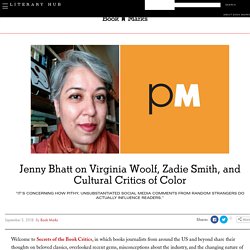
Each week we’ll spotlight a critic, bringing you behind the curtain of publications both national and regional, large and small. This week we spoke to writer, translator, and book reviewer, Jenny Bhatt. Article continues after advertisement Book Marks: What classic book would you love to have reviewed when it was first published? Jenny Bhatt: Anything by Virginia Woolf. Roland Barthes' Contribution to Literary Criticism. Embodying a transformation from structuralism to poststructuralism, Roland Barthes, though initially characterised by a Marxist perspective, extended structural analysis and semiology to broad cultural phenomena, and promulgated and popularised the poststructuralist notions of “the death of the author”, of the text as a site of freeplay, and the difference between the “work” and the “text” and the “readerly” and “writerly” text.
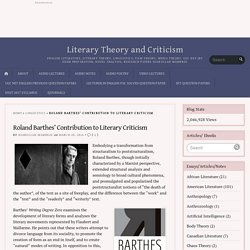
Barthes’ Writing Degree Zero examines the development of literary forms and analyses the literary movements represented by Flaubert and Mallarme. He points out that these writers attempt to divorce language from its sociality, to promote the creation of form as an end in itself, and to create “natural” modes of writing. In opposition to this, Barthes argues that language is inextricably bound to social institutions and norms. His. Derrida on Puella Magi Madoka Magica, circa 2011 (Decolourised) : Animemes. In theory: The Death of the Author. Ecclesiastes famously warns us that "Of making many books there is no end" – the same, of course, applies to book commentaries.
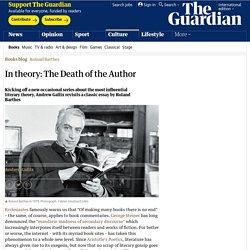
George Steiner has long denounced the "mandarin madness of secondary discourse" which increasingly interposes itself between readers and works of fiction. For better or worse, the internet – with its myriad book sites – has taken this phenomenon to a whole new level. Introduction to Modern Literary Theory. Psychoanalytic Criticism The application of specific psychological principles (particularly those of Sigmund Freud and Jacques Lacan [zhawk lawk-KAWN]) to the study of literature. Psychoanalytic criticism may focus on the writer's psyche, the study of the creative process, the study of psychological types and principles present within works of literature, or the effects of literature upon its readers (Wellek and Warren, p. 81). In addition to Freud and Lacan, major figures include Shoshona Felman, Jane Gallop, Norman Holland, George Klein, Elizabeth Wright, Frederick Hoffman, and, Simon Lesser. Key Terms: Unconscious - the irrational part of the psyche unavailable to a person's consciousness except through dissociated acts or dreams.
Freud's model of the psyche: Id - completely unconscious part of the psyche that serves as a storehouse of our desires, wishes, and fears. Absurd - a term used to describe existence--a world without inherent meaning or truth. Key Terms : Key Terms: Hegel versus Heidegger - Journal #32 February 2012 - e-flux. Heidegger’s Critique of Hegel One of the standard critiques of Hegel, first formulated already by the “young Hegelians,” concerns the apparent contradiction between Hegel’s dialectical method and his system. While Hegel’s method approaches reality in its dynamic development, discerning in every determinate form the seeds of its own destruction and self-overcoming, his system endeavors to render the totality of being as an achieved order in which no further development is in view. Surveillance in Science Fiction: A Colonializing Force.
Judging from her novel, Namwali Serpell might disagree with Oloixarac’s pessimistic outlook. The Old Drift is a massive, complicated work with a straightforward Hegelian opposition at its heart: Colonialism and anti-colonialism collide, and the resulting clash transforms Serpell’s fictional Zambia. The novel opens at the turn of the 20th century, as a British colonist named Percy Clark observes the construction of a bridge near Victoria Falls in what was then called Southern Rhodesia. At the end, a multiracial trio of Zambian revolutionaries destroys the nearby Lake Kariba dam.
The function of colonialism, the novel suggests, is to contain power; the function of anti-colonialism is to unleash it. The Old Drift begins with Clark and his British comrades living “as brave pioneers” by Victoria Falls. Psychoanalysis: Freud's theory and the ideas that have followed. Can we ever really know ourselves, let alone other people? For Sigmund Freud and his followers, our lives are shaped by forces we are totally unaware of. Although we think we're in charge, we just keep repeating the same blunders without knowing it.
Poets. Thoughts on Susan Sontag's "Erotics of Art" Against Interpretation and Toward a New Consciousness of Art: Thoughts on Susan Sontag’s “Erotics of Art” When I first read Susan Sontag’s essay, “Against Interpretation,” I knew that I was going to interpret her work on some level like it or not. It’s what I have been trained to do. The process is largely subconscious, it is so deeply ingrained in my psyche. For this reason, I did not want to write a critical essay in response to Sontag’s essay, but upon further meditation (and possibly interpretation) I changed my mind. Fiction in Review - Birkerts - 2000 - The Yale Review. Pascale Casanova: Literature as a World. New Left Review 31, January-February 2005. New Left Review 31, January-February 2005. Franco Moretti: Conjectures on World Literature. New Left Review 1, January-February 2000. New Left Review 1, January-February 2000. Discourse on Colonialism.
Litandideology. Ideology and Ideological State Apparatuses by Louis Althusser 1969-70.